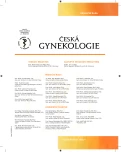Laparoscopic abdominal cerclage in a patient with recurrent miscarriages abortions – case report
Authors:
K. Huml 1; L. Kantor 2; M. Procházka 3; M. Studničková 1
; R. Pilka 1
Authors‘ workplace:
Porodnicko-gynekologická klinika FN a LF UP, Olomouc, přednosta prof. MUDr. R. Pilka, Ph. D.
1; Novorozenecké oddělení FN a LF UP, Olomouc, primář MUDr. L. Kantor, Ph. D.
2; Ústav lékařské genetiky FN a LF UP, Olomouc, přednosta doc. MUDr. M. Procházka, Ph. D.
3
Published in:
Ceska Gynekol 2016; 81(1): 58-62
Overview
Objective:
The use of laparoscopic abdominal cerclage in a patient with habitual miscarriage.
Design:
Case report and literature review.
Setting:
Department of Obstetrics and Gynecology, University Hospital Olomouc, Faculty of Medicine, Palacký University Olomouc, Department of Neonatology, University Hospital Olomouc, Faculty of Medicine, Palacký University Olomouc, Institute of Medical Genetics, University Hospital Olomouc, Faculty of Medicine, Palacký University Olomouc.
Case report:
The patient is a 37 years old woman with a history of recurrent miscarriages. She had one labor at term and six pregnancies that were lost in the second trimester despite McDonald cerclages. Abdominal cerclages are necessary when the standard transvaginal cerclages fail or anatomical abnormalities preclude the vaginal placement. The disadvantage of the transabdominal approach is that it requires at least 2 laparotomies with significant morbidity and hospital stays. We discuss a case of abdominal cerclage performed laparoscopically. A 5 mm Mersilene tape was placed laparoscopically at the level of the internal os as an interval procedure. We feel it offers less morbidity and in the proper hands eliminates or significantly shortens hospital stays. Subsequent pregnancy was terminated at 28 weeks by caesarean section after premature rupture of membranes.
Conclusion:
Laparoscopic abdominal cerclage seems to be relatively effective option for the prevention of habitual abortion patients, which fail conventional surgical procedures in dealing with cervical incompetence. The success of subsequent full term pregnancy is given as 70%.
KEYWORDS:
cerclage, laparoscopy, cervical incompetence
Sources
1. Adam, JF., Alvarez, M., Smith, DH., et al. Robotic-assisted laparoscopic cerclage in a pregnant patient. Amer J Obstet Gynec, 2009, 200, 2, p. e10–e11.
2. Burger, NB., et al. Effectiveness of abdominal cerclage placed via laparotomy or laparoskopy: Systematic review. J Minimally Invasive Gynecol, 2011, 18, p. 696–704.
3. Carter, JF., Soper, DE., Goetzl, LM., et al. Abdominal cerclage for the treatment of recurrent cervical insufficiency: laparoscopy or laparotomy? Am J Obstet Gynecol, 2009, 201, p. 111.e1–4.
4. Hassan, SS., et al. Vaginal progesteron reduces the rate of preterm birth in women with a sonographic short cervix: A multicenter, randomized, double-blind, placebo-controlled trial. Ultrasound Obstet Gynec, 2011, 38, p. 18–31.
5. Lotgering, FK., Gaugler-Senden, IP., Lotgering, SF., Wallenburg, HC. Outcome after transabdominal cervicoisthmic cerclage. Obstet Gynecol, 2006, 107, p. 779-784.
6. McDonald, IA. Suture of the cervix for inevitable miscarriage, J Obstet Gynaecol Br Common, 1957, 64, p. 346–353.
7. Mingione, MJ., Scibetta, JJ., Sanko, SR., Phipps, WR. Clinical outcomes following interval laparoscopic transabdominal cervico-isthmic cerclage placement: case series. Hum Reprod, 2003, 18, p. 1716–1719.
8. Novy, MJ. Transabdominal cervicoisthmic cerclage for the management of repetitive abortion and premature delivery. Am J Obstet Gynecol, 1982, 1, p. 44–54.
9. Raedah Al-Fadhli, Togas Tulandi. Laparoscopic abdominal cerclage. Review article. Obstetrics and Gynecology Clinics of North America, 2004, 31, 3, p. 497 504.
10. Vašek, P., Michalec, I. Cerkláž ve Fakultní nemocnici Ostrava. Actual Gyn, 2014, 6, p. 60–62.
11. Scibetta, J., Sanko, SR., Phipps, WR. Laparoscopic transabdominal cervicoisthmic cerclage. Fertil Steril, 1998, 69, 1, p. 161–163.
12. Whittle, WL., Sukhbir, S., Singh., AL., et al. Laparoscopic cervico-isthmic cerclage: surgical technique and obstetric outcomes. Am J Obstet Gynecol, 2009, 201, p. 364.e1–7.
13. Zaveri, V., Aghajafari, A., Amankwah, K., et al. Abdominal versus vaginal cerclage aftera failed transvaginal cerclage: A systematic rewiev. Am J Obstet Gynecol, 2002, 187, p. 868–872.
Labels
Paediatric gynaecology Gynaecology and obstetrics Reproduction medicineArticle was published in
Czech Gynaecology

2016 Issue 1
Most read in this issue
- Level of AMH as a predictor of the result of ovarian stimulation
- Ectopic pregnancy in the ultrasound. Case reports. Retrospektive analysis
- Transdermal estrogen spray in therapy of postmenopausal syndrome
- Giant uterine fibroid – case report
